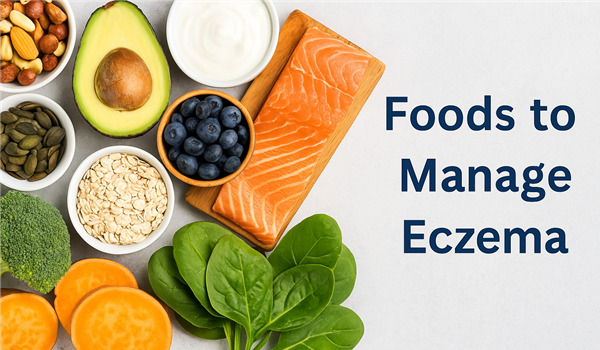Eczema diet skin health nutrition

Patient Information Leaflet: Foods to Support Skin Health and Help Manage Eczema
Kensington Medical Centre – Belfast
⸻
What Is Eczema?
Eczema (also known as atopic dermatitis) is a common skin condition that causes dryness, itching, redness, and inflammation. While diet isn’t a cure, some foods can help reduce flare-ups, support healthy skin, and manage inflammation.
⸻
How Can Diet Help?
• Reduce skin inflammation
• Support the skin’s natural barrier
• Avoid common food triggers (if any)
• Boost overall immunity
⸻
Skin-Friendly Foods to Include
1. Omega-3 Fatty Acids
Reduce inflammation and support skin health.
Examples:
• Oily fish (salmon, mackerel, sardines)
• Flaxseeds, chia seeds
• Walnuts
2. Vitamin E-Rich Foods
Protect skin cells and support healing.
Examples:
• Sunflower seeds, almonds
• Spinach, avocado
• Sweet potatoes
3. Probiotic Foods
Support a healthy gut, which may help reduce eczema symptoms.
Examples:
• Live yoghurt
• Kefir
• Sauerkraut, kimchi
• Miso
4. Prebiotic Foods
Feed good gut bacteria and support the immune system.
Examples:
• Bananas, apples
• Garlic, onions, leeks
• Oats, asparagus
5. Vitamin A and Beta-Carotene
Help with skin repair and protection.
Examples:
• Carrots, sweet potatoes, butternut squash
• Leafy greens
• Eggs
6. Water and Hydrating Foods
Keep skin moisturised from the inside out.
Examples:
• Water (6–8 glasses a day)
• Cucumber, melon, oranges
⸻
Foods to Watch or Avoid
While not all people with eczema react to foods, some may notice flare-ups from:
• Cow’s milk or dairy products
• Eggs
• Wheat or gluten-containing foods
• Soy products
• Nuts or shellfish
Tip: Keep a food and symptom diary to track possible triggers. Always speak to your GP before removing major food groups from your diet.
⸻
Healthy Skin Tips
• Eat a balanced diet with plenty of fruit and vegetables
• Choose wholefoods over processed ones
• Include oily fish and plant oils regularly
• Stay hydrated
• Limit sugary foods and drinks, which may worsen inflammation
• Avoid foods high in artificial additives or preservatives if sensitive
⸻
When to See a Doctor
Speak to your GP if you:
• Think certain foods trigger your eczema
• Need help identifying or eliminating allergens
• Have ongoing skin flare-ups or new symptoms
• Want advice on supplements (like omega-3 or probiotics)
You may be referred to a dietitian, dermatologist, or allergy specialist for further help.
⸻
For more information, visit www.nhs.uk/conditions/atopic-eczema
This leaflet is for general information only. Please speak to your healthcare provider for advice specific to you.
Medical Disclaimer
The dietary advice and information provided in this leaflet are for general guidance and educational purposes only. They are not intended to replace personalised advice, diagnosis, or treatment from a qualified healthcare professional.
If you have a medical condition, are taking medication, are pregnant or breastfeeding, or have specific dietary needs or food allergies, you should consult your GP, dietitian, or another healthcare provider before making significant changes to your diet.
Following general dietary recommendations without proper medical supervision may not be suitable for everyone and could result in unintended health effects. Always seek individualised medical advice for your personal health circumstances.
Page created: 03 June 2025